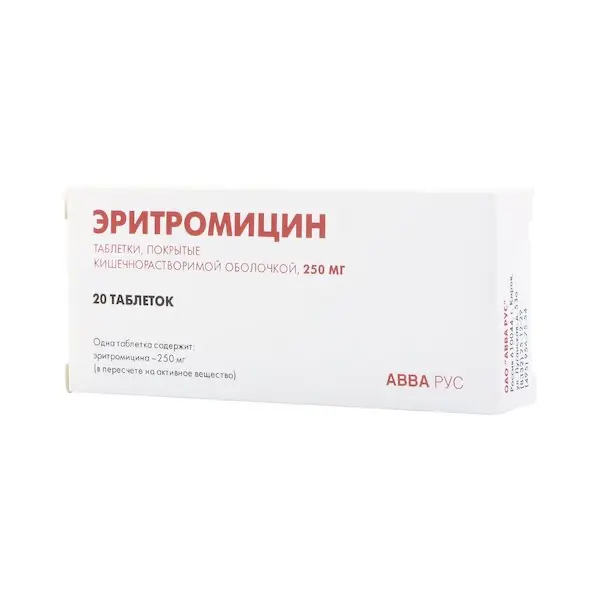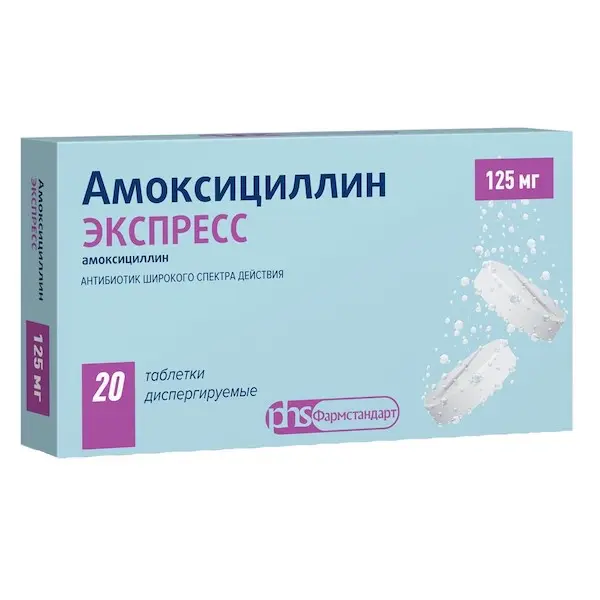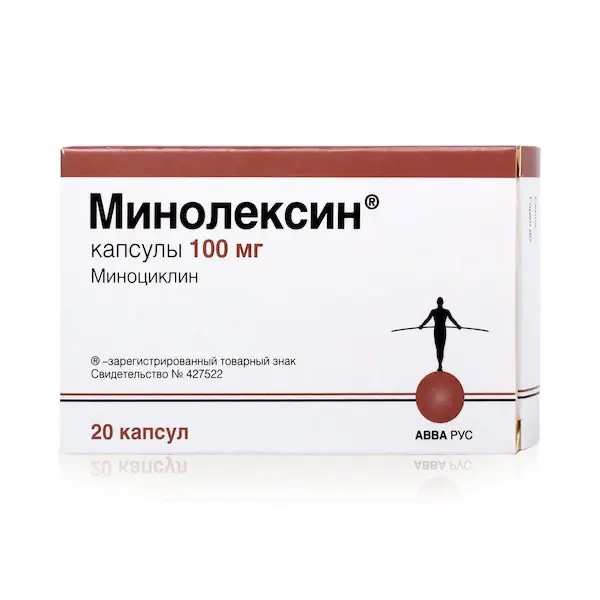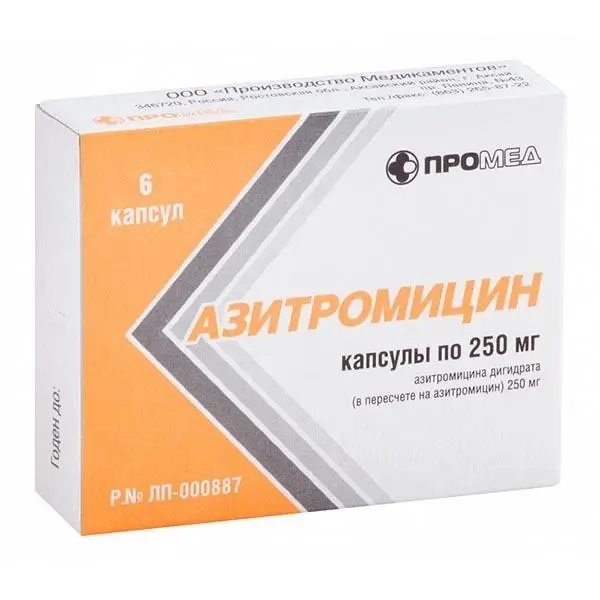Description
Erythromycin Pharmacodynamics
Bacteriostatic antibiotic of macrolide group, binds reversibly to 50S ribosome subunit in its donor part, which disrupts formation of peptide bonds between amino acid molecules and blocks protein synthesis in microorganisms (does not affect nucleic acid synthesis). When used in high doses it can show bactericidal effect. The spectrum of action includes Gram-positive (Staphylococcus spp, producing and not producing penicillinase, including Staphylococcus aureus; Streptococcus spp. Streptococcus pneumoniae, Streptococcus pyogenes, alpha-hemolytic streptococcus (Viridans group), Bacillus anthracis, Corynebacterium diphtheriae, Corynebacterium minutissimum) and Gram-negative microorganisms (Neisseria gonorrhoeae, Haemophilus influenzae, Bordetella pertussis, Brucella spp, Legionella spp. including Legionella pneumophila) and other microorganisms: Mycoplasma spp. (including Mycoplasma pneumoniae), Chlamydia spp. (including Chlamydia trachomatis), Treponema spp., Rickettsia spp., Entamoeba histolytica, Listeria monocytogenes.
Gram-negative bacilli are resistant: Escherichia coli, Pseudomonas aeruginosa, as well as Shigella spp. and Salmonella spp. Microorganisms whose growth is inhibited when the antibiotic concentration is less than 0.5 mg/l, moderately sensitive – 1-6 mg/l, moderately resistant and resistant – 6-8 mg/l are referred to the sensitive group.
Indications for using Erythromycin
Bacterial infections caused by susceptible microflora: diphtheria (including bacteriocarriage), pertussis (including prophylaxis), trachoma, brucellosis, legionary disease, erythrazma, listeriosis, scarlet fever, amebic dysentery, gonorrhea; conjunctivitis in infants, pneumonia in children, urogenital infections in pregnant women caused by Chlamydia trachomatis.
Primary syphilis (in patients allergic to penicillins), uncomplicated chlamydia in adults (with localization in the lower parts of the genitourinary tract and rectum) with intolerance or ineffectiveness of tetracyclines, etc.
Infections of ENT organs (tonsillitis, otitis media, sinusitis).
Infections of the biliary tract (cholecystitis);
Infections of the upper and lower respiratory tract (tracheitis, bronchitis, pneumonia);
Skin and soft tissue infections (pustular skin diseases, including juvenile acne, infected wounds, bedsores, II-III degree burns, trophic ulcers).
Eye mucous membrane infections.
Prevention of exacerbations of streptococcal infection (tonsillitis, pharyngitis) in patients with rheumatism. Prevention of infectious complications during medical and diagnostic procedures (including preoperative preparation of the intestine, dental interventions, endoscopy, in patients with cardiac defects).
Contraindications
Hypersensitivity to erythromycin and other components of the drug,
hearing loss,
Simultaneous use of terfenadine, ergotamine, dihydroergotamine, astemizole, cisapridine, pimozide,
children under 3 years of age,
Breast-feeding period,
lactose intolerance, lactase deficiency, glucogalactose malabsorption.
Dosage and administration of Erythromycin
- Inside.
- Single dose for adults and teenagers over 14 years old is 0.25-0.5 g, daily dose – 1-2 g. Interval between doses is 6 hours. In case of severe infections daily dose may be increased up to 4 g.
- For children from 3 to 14 years old, depending on the age, body weight and severity of infection, we prescribe a dose of 30-50 mg/kg/day in 2-4 doses. In case of severe infections, the dose may be doubled.
- For treatment of diphtheria carrier – 0.25 g 2 times a day. A course dose for treatment of primary syphilis is 30-40 g; treatment duration is 10-15 days.
- In amebic dysentery it is 0.25 g 4 times per day for adults, 30-50 mg/kg/day for children; the course duration is 10-14 days.
- In legionellosis – 0.5-1 g 4 times a day for 14 days.
- In gonorrhea – 0.5 g every 6 hours for 3 days, then 0.25 g every 6 hours for 7 days.
- For preoperative bowel preparation to prevent infectious complications – orally, 1 g at 19 h, 18 h and 9 h before surgery (3 g in total).
- For streptococcal infection prophylaxis (tonsillitis, pharyngitis) in adults – 20-50 mg/kg/day, in children – 20-30 mg/kg/day, the course duration is at least 10 days.
- For prevention of septic endocarditis in patients with cardiac defects – 1 g for adults and 20 mg/kg for children, 1 hour before therapeutic or diagnostic procedure, further 0.5 g for adults and 10 mg/kg for children, repeatedly after 6 hours.
- In pertussis, 40-50 mg/kg/day for 5-14 days.
- In children with pneumonia, 50 mg/kg/day in 4 doses, for at least 3 weeks.
- In case of urogenital infections during pregnancy – 0.5 g 4 times a day for at least 7 days or (in case of poor tolerance of this dose) – 0.25 g 4 times a day for at least 14 days.
- In adults with uncomplicated chlamydia and tetracycline intolerance – 0.5 g 4 times daily for at least 7 days.





